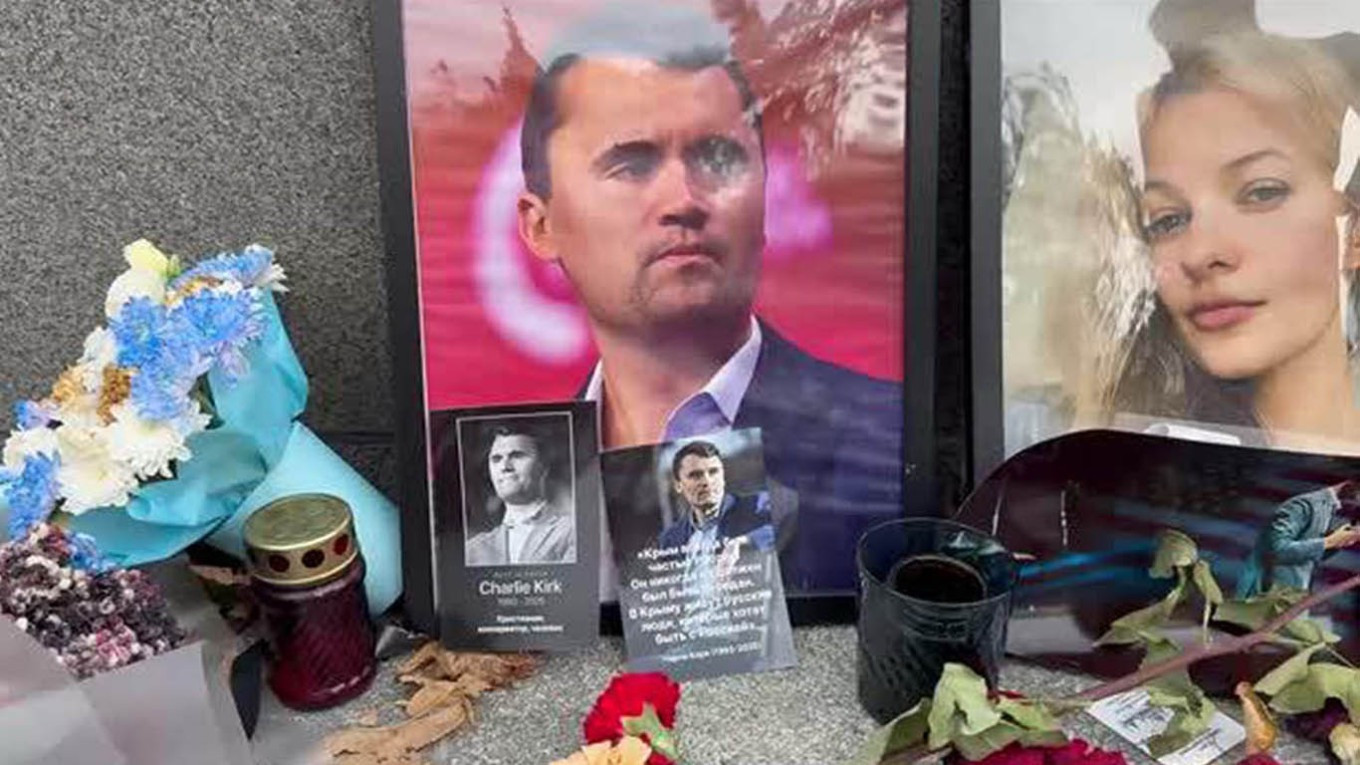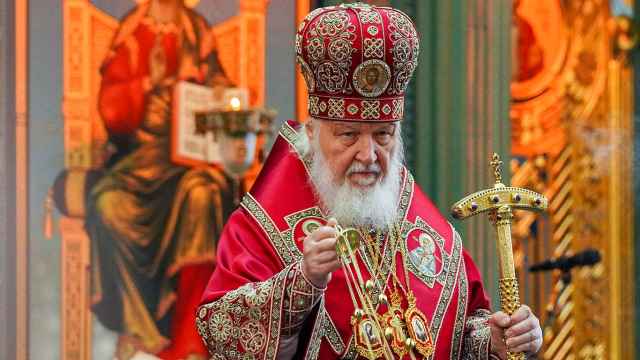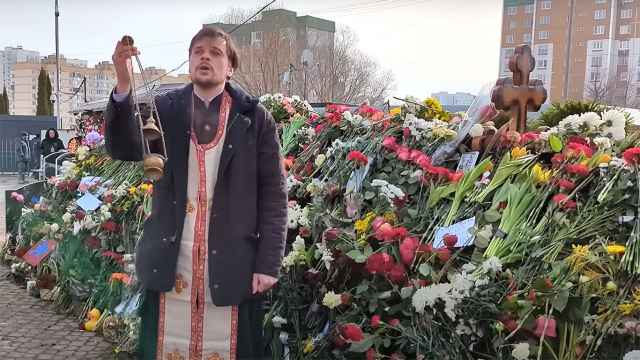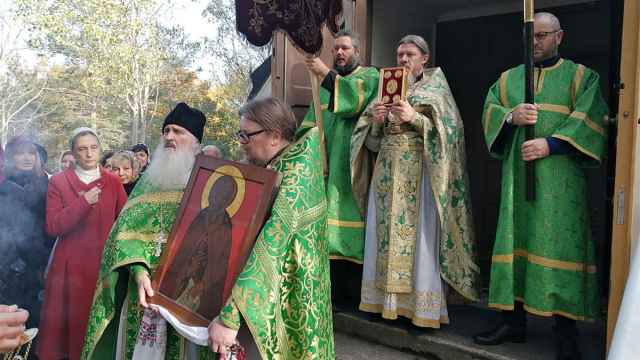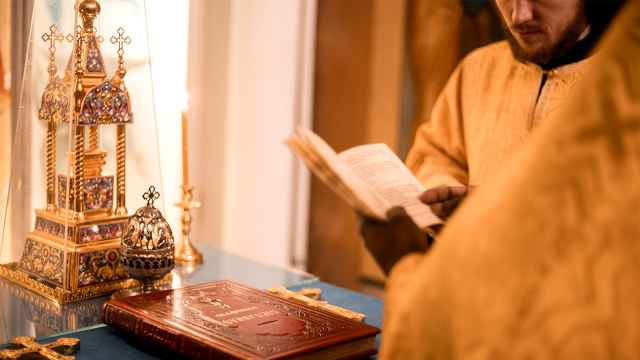Just hours before the memorial service for slain American activist Charlie Kirk began at State Farm Stadium in Glendale, Arizona, Pravoslavie.ru and its English counterpart OrthoChristian.com published an article by Metropolitan Tikhon Shevkunov — arguably the hierarch closest to the Kremlin — with an obvious intent: to glorify Kirk.
The timing was more than symbolic — it revealed faith reimagined for geopolitical ends. The text, immediately promoted by Kirill Dmitriev of the Russian Direct Investment Fund, revealed far more about Russia’s current political anxieties than about American conservatism.
Shevkunov is no ordinary cleric. The former head of Moscow’s Sretensky Monastery and author of the bestselling “Everyday Saints,” he has long been considered one of President Vladimir Putin’s spiritual advisers and maintains close ties to the Kremlin. His elevation to metropolitan of annexed Crimea in 2018 underscored his political significance. Shevkunov has consistently cast Russian Orthodoxy as the spiritual foundation of Russian statehood, making his sudden enthusiasm for an American Protestant activist all the more striking.
Equally significant is the essay’s promoter, Kirill Dmitriev. As CEO of the Russian Direct Investment Fund (RDIF), Dmitriev has played a central behind-the-scenes role in cultivating ties with American business and political actors. During the Trump administration, he reportedly served as an informal channel between Moscow and Trump’s inner circle, meeting associates and drafting “reconciliation plans.” His promotion of Metropolitan Tikhon’s essay suggests this is not just a personal theological reflection but part of a broader strategy aimed at Washington.
Perhaps most notable is the spectacle of Russian conservatives, who for decades denounced Western decadence, suddenly discovering kindred spirits in American activists. Metropolitan Tikhon wrote with almost breathless admiration: “Others — astonished and grieved that he is no longer among the living — discovered in him an unexpected kindred spirit.”
While Tikhon’s allies view his praise as proof of a new ecumenical vision, critics highlight the irony: the Russian hierarchy now celebrates the very brand of evangelical, media-driven Christianity it once condemned. Supporters say this reflects Orthodox openness; detractors see calculated expediency.
This shift clearly represents a dramatic departure from the Russian Orthodox narrative of spiritual superiority over the materialistic West. For years, Russian Orthodox ideologues have positioned their nation as the last bastion of authentic Christianity against a godless, liberal West. The metropolitan's eagerness to claim Kirk as an ally suggests a new strategy: finding common cause with Western conservatives to legitimize Russia's own political positions on the global stage.
It is particularly striking given the Russian Orthodox Church's historical antipathy toward American Protestantism. Kirk, after all, represents precisely the kind of individualistic, evangelical Christianity that Russian Orthodox theologians have traditionally criticized as theologically shallow and culturally corrosive. Yet here is one of Russia's most prominent hierarchs holding up a Protestant activist as a model for Orthodox youth.
Though Metropolitan Tikhon’s essay is saturated with religious vocabulary — “Gospel truth,” “Christian love,” “martyric death” — the name of Jesus Christ is absent from his own commentary. By contrast, Kirk’s words, quoted extensively, do mention Christ.
Tikhon presents Christianity as a set of cultural-political values rather than a living relationship with Christ. He praises Kirk’s “bold defense of Gospel truth” without clarifying what that truth is. This reduces Christianity to a political program, with Christ himself inconveniently omitted as a figure that is too demanding and likely to disrupt political agendas.
Supporters claim that focusing on broad values is needed for coalition-building. Critics warn that it empties faith of meaning, turning it into ideology.
Metropolitan Tikhon’s opening admission is telling: “Just a week ago, the name Charlie Kirk was virtually unknown in Russia.” Why the urgency to canonize an American activist few Russians had heard of? The answer lies in what Kirk symbolizes: as a friend of U.S. President Donald Trump, he offers Russian conservatives a convenient symbol and blank canvas for mythmaking.
His profile — young, media-savvy, unapologetically conservative — provides a template for Russian Orthodox activists. Tikhon’s description of Kirk’s campus activism reads like a recruitment manual, suggesting Orthodox youth should emulate his public style.
The essay reflects the construction of a “conservative international” — a transnational civil religion uniting disparate movements under “traditional values.” National and theological differences are minimized in favor of tactical solidarity against liberal internationalism.
The result is not authentic conviction but instrumentalized faith. Tikhon’s essay reads less like spiritual reflection than a position paper for a global conservative alliance. References to “post-truth” and “relativism” echo American culture-war rhetoric, adapted for Russian purposes.
The timing and promotion of the essay — particularly Dmitriev’s involvement — underscore its political character. Facing isolation, Russia’s Church now positions itself as a bridge to American conservatives. By adopting their language and heroes, Moscow signals readiness to join a global conservative movement on its own terms.
This also serves domestic purposes. By presenting American conservatives as allies, Russia can embrace select aspects of U.S. culture while maintaining anti-Western rhetoric, dividing the West into “good” conservatives and “bad” liberals.
The contradictions are glaring. The same Church that blesses Russia’s invasion of Ukraine in the name of resisting Western decadence now celebrates an American activist embodying individualistic Christianity as a model for Russian youth. American influences are evil when liberal, admirable when conservative. Western Christianity is heretical when it challenges Russia’s interests, but exemplary when politically useful.
These contradictions reveal that the real organizing principle here is not theological consistency but political expediency. American influences are evil when they promote liberal values but admirable when they advance conservative causes. Western Christianity is heretical when it challenges Russian interests but exemplary when it can be marshaled for Russian purposes.
Metropolitan Tikhon’s essay on Charlie Kirk offers a window into Russian Orthodoxy’s current role in Russia, as well as its international engagement. What presents itself as spiritual reflection is revealed as political maneuvering. Eternal values are subordinated to temporal alliances. Politics wears the mask of faith.
When Christ disappears even as “Christian values” are proclaimed, when obscure activists are elevated for political gain, faith has been reduced to ideology. Orthodoxy, with its rich tradition, deserves better than to be weaponized for Kremlin politics.
American conservatives, too, should ask whether Russia’s embrace reflects genuine fellowship or tactical opportunism. When sovereign wealth fund chiefs promote religious essays as soft power, the fusion of God and mammon should give pause.
The lesson of Charlie Kirk is not what Metropolitan Tikhon intended. It shows how religious language can be harnessed for politics, how spiritual traditions can be subordinated to geopolitical aims, and how Christ’s name can vanish even as His values are loudly invoked.
Finally, it bears remembering: Tikhon has long been seen as a leading candidate for the patriarchal throne. This essay may well be more than commentary. It could be a declaration — and a move in the battle for the Church’s future leadership.
A Message from The Moscow Times:
Dear readers,
We are facing unprecedented challenges. Russia's Prosecutor General's Office has designated The Moscow Times as an "undesirable" organization, criminalizing our work and putting our staff at risk of prosecution. This follows our earlier unjust labeling as a "foreign agent."
These actions are direct attempts to silence independent journalism in Russia. The authorities claim our work "discredits the decisions of the Russian leadership." We see things differently: we strive to provide accurate, unbiased reporting on Russia.
We, the journalists of The Moscow Times, refuse to be silenced. But to continue our work, we need your help.
Your support, no matter how small, makes a world of difference. If you can, please support us monthly starting from just $2. It's quick to set up, and every contribution makes a significant impact.
By supporting The Moscow Times, you're defending open, independent journalism in the face of repression. Thank you for standing with us.
Remind me later.


